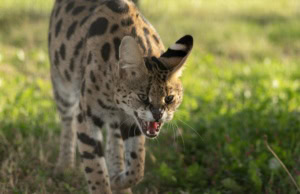Most people agree that animals like big cats don’t make good pets. Dangerous carnivores and predators pose a severe threat to human safety, so it’s clear why we don’t want to keep them in our homes. But a lot of people still think many other wild animals would make good pets. For example: squirrels, raccoons, and foxes seem less threatening because they don’t have the physical strength and power to take us down. Does that mean we should keep them in our homes?
Complicated Needs
There are a number of reasons to keep wild animals in the wild. For one, providing the correct environment for a wild animal is tricky. Their needs are complex, and most people cannot provide the correct psychological and physical demands that come along with a wild animal.
Invasive Species
When people keep wild animals as pets, they are putting other species at risk. Research shows that hundreds of the invasive species across the U.S. are due to the pet trade. When people decide they don’t want to take care of a wild animal anymore, they might release it into the wrong type of wild. It is presumed that some of our African servals here at Turpentine Creek were released into the wild by their previous owners. Depending on the environment, that animal might survive in the wild on its own, and then it can cause numerous problems for the local ecosystem.

Endangerment
Taking an animal from the wild can not only endanger other animals, but it can also put that particular animal’s species as a whole at risk. Parrots are a great example of this. Parrots are the world’s most threatened group of birds, and sadly, their capture for the pet trade is a huge contributor to this.
Danger
In addition to how it harms the animals themselves, wild animals also pose a threat to us humans, even if we don’t think they do. While a smaller mammal, reptile, or bird may seem harmless, they can certainly still defend themselves if they feel threatened or scared. Many animals might lash out with biting or scratching. They can also carry diseases and parasites that could be fatal to humans. Lyme disease, rabies, salmonella, distemper, and more can be transferred to people from animals. This list of zoonotic diseases will give you an idea of just how many animal-borne illnesses can affect humans.

Legality
One must also keep in mind the legality of owning an exotic or wild animal as a pet. There are different restrictions on all sorts of wild animals, usually dependent on the state, but can also change on a city and/or county level. Here in Arkansas for example, animals like skunks, apes, and box turtles are illegal to keep as pets.
Ethics
Ethical concerns are another thing to consider. Animals deserve to be wild and free like nature intended. Their needs and instincts are tied to their natural habitats, and they should only be captive when there is no other choice. If they are too habituated by people already and can no longer be returned to the wild, that’s one thing. But they shouldn’t be taken from the wild just to be someone’s pet. Just because we CAN keep a wild animal as a pet, doesn’t mean that we should.
Sources
https://www.aza.org/connect-stories/stories/why-wild-animals-dont-make-good-pets
https://medlineplus.gov/animaldiseasesandyourhealth.html
https://www.cdc.gov/healthy-pets/diseases/index.html
https://www.agfc.com/education/captive-wildlife/
*Published by Sara Edwards on 08/02/2025*